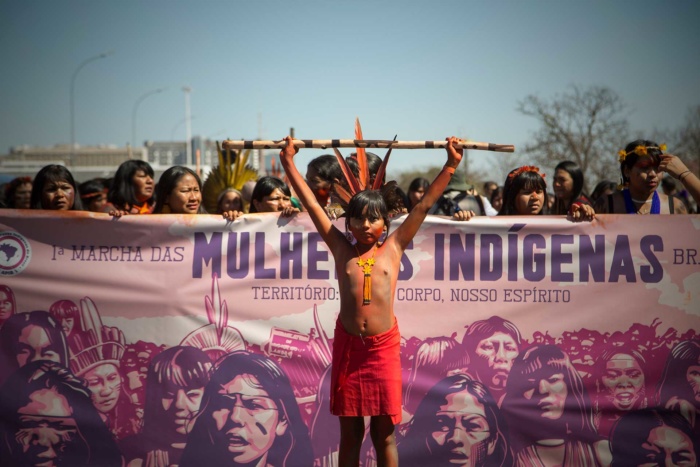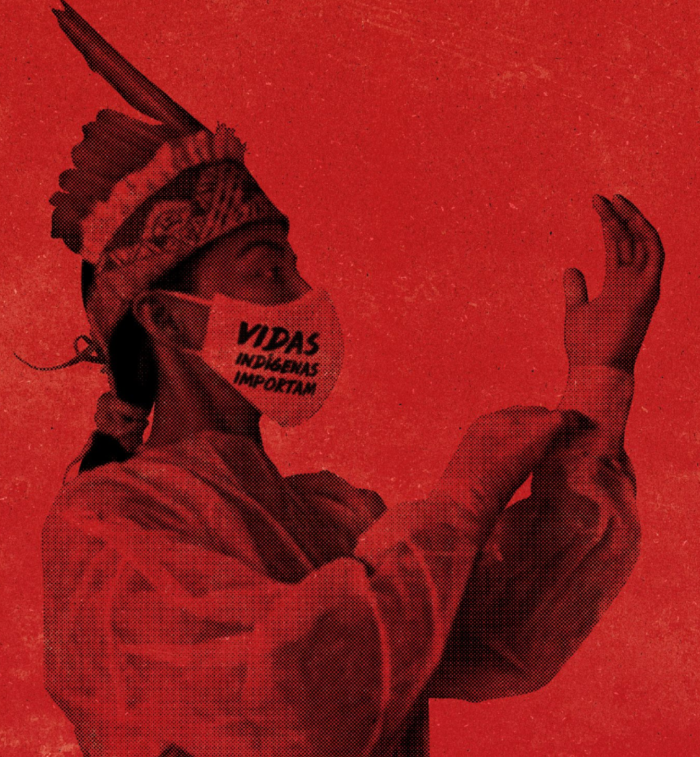Brazil’s indigenous peoples face the most serious threats since the military dictatorship: a government determined to eliminate their rights, abolish their culture and ‘integrate’ them into an ultra-neoliberal economy; and a pandemic to which they are particularly vulnerable and which threatens their very existence.
In the last of three articles, LAB correspondent Nayana Fernandez and University of São Paulo (USP) researcher Cauê Tanan, look at the specific effects and dangers of the pandemic for these communities, their determination to resist and the international recognition they are receiving. Here are the links to Article 1 and Article 2.
Downhill State Of Affairs
The series of attacks documented in our second article happened when all efforts should have been diverted to focus on the most effective measures to combat the virus before vaccines became available, and in particular rigorous social isolation. Since March 2020, people in Brazil were, and still are, divided into two main groups: those who expect the authorities to take urgent action to combat the virus and those who believe Bolsonaro’s fake news apparatus and prefer to deny science and the existence of the pandemic.
Every available method of prevention has been discouraged, being treated as an object of ridicule by Bolsonaro, his family, his closest followers and some other members of this murderous administration. Instead, they have done their utmost to encourage people to mingle together freely, have minimized the significance of the virus and made jokes about the deaths.
According to ISA, a major Brazilian not-for-profit organization, the most vulnerable indigenous lands affected by COVID-19 are:
- The Barragem, Krukutu and Jaraguá territories, all in São Paulo and inhabited by Guarani people;
- The Javari Valley territory, inhabited by 16 different peoples in western Amazon;
- The Yanomami territory inhabited by Yanomami in north Amazon;
- The Raposa Serra do Sol territory inhabited by Macuxi, Uapixana, Ingaricó, Taurepang and Patamona in Roraima.
Apart from the Yanomami, who have their own terrible history marked by miners’ invasions and contagious diseases in their territory, all of the mentioned communities are close to urban areas, hence their vulnerability. Besides that, both the Roraima and Amazonas state administrations are close to Bolsonaro’s politics. São Paulo, on the other hand, is the region with the highest number of infections and where the first COVID-19 cases emerged in Brazil, soon spreading throughout the country.
What was bad just got worse
But, as Brazilians say, ‘what was already bad, just got even worse’: a few months after COVID-19 hit South America, the population found itself without a Health Minister. Luiz Henrique Mandetta was fired in April after a month of conflict with Bolsonaro. Then, Nelson Teich took over, but left the seat less than a month into the post, also due to disagreements with Bolsonaro about the use of chloroquine and social isolation measures. In the midst of the pandemic, the Ministry was left with no one in charge for over 100 days. Eventually, Eduardo Pazuello, a military general with no experience whatsoever in health or its administration, took over the post and is still holding the position today as he puts into practice many of Bolsonaro’s high-risk ideas.
In June 2020, while the number of infected and dead indigenous and non-indigenous people increased, the military Minister decided to suppress disclosure of the case count. Even the DSEIs, Distritos de Saúde Indígena (Indigenous Health Districts), were forced to remain silent about thousands of cases, as if they were trying to ‘hide the bodies’ – a decision that recalls the bloodiest times of the 1970s dictatorship. In addition, regional governments of Amazonas and Roraima states avoided passing COVID-19 testing kits to indigenous areas, making it very difficult to count actual cases in many communities.
If that was not enough, the Brazilian government embezzled COVID-19 test funds to invest in evangelical church anti-abortion activities, coordinated by Bolsonaro’s wife. The intimate relationship between Brazil’s president and evangelical churches has been an open secret since his election campaign in 2018, which may go some way towards explaining this diversion of public funds.

Indigenous peoples determined to resist
In these devastating circumstances, APIB decided to work on what the Brazilian government should have done: to disclose the numbers of cases in communities and work on proper conditions for everyone to be tested. APIB represents the strongest Indigenous political force in Brazil today and is connected with regional indigenous organizations and community leaders throughout the country. They have been able to map the number of those affected by the coronavirus – published on an impressive website filled with content in both English and Spanish, as well as Portuguese – and work alongside some local governments to provide testing and means for assistance.
The initiative, especially the statistical records, caused serious annoyance among political leaders associated with the presidency. General Augusto Heleno, Jair Bolsonaro’s senior security adviser, has used his personal twitter to accuse APIB of committing a crime against the State. But instead of being intimidated, APIB is becoming stronger. It connects daily with human rights organizations around the globe and, in recognition of this superb work, it has recently won the International Letelier-Moffitt Award for defending indigenous peoples’ rights in Brazil.

Resistance honoured
In fact, this year, many indigenous groups in Brazil have seen their struggle for human rights and environmental protection recognized by important national and worldwide institutions. In light of the novel coronavirus pandemic and the catastrophic political situation the Brazilian government has reached, Sonia Guajajara, APIB executive coordinator, has won the Alceu Amoroso Lima Award which honours peoples who stand out in the humanitarian struggle for peoples rights.
Another example is the Munduruku people who, under the name of their leader Alessandra Korap, have recently received two different awards: the North American Robert F. Kennedy Award for Human Rights and the German Taz Panter Preis. The prizes reaffirm their outstanding fight against one of the main causes of climate change: deforestation caused by illegal loggers and some big corporations in the Amazon, as well as their exceptional work in informing peoples around all their villages about the risks and prevention methods against COVID-19.
These awards represent our struggle, our resistance.
Alessandra Korap Munduruku
The actions undertaken by APIB, Bororo, Guarani, Munduruku, Xavante and other indigenous and forest peoples are undoubtedly fundamental movements of resistance in such exceptional times we are living in Brazil. Bolsonaro’s government, specially in relation to the COVID-19 pandemic, represents the colonising spirit which looms over the whole of Latin America, and other continents with similar leaders, attracting the support of some world powers with predatory economic interests. It is also the legacy of a romanticized dictatorial history embraced by the bogus Christian spirit of some evangelical groups.
These recent awards are only a few examples of how indigenous peoples in Brazil are on the main battle front against the ongoing authoritarianism, forest destruction, and indeed in favour of life itself. Over five centuries of demonstrating their strength, no matter what infectious agents have turned up, history shows they have been learning with their ancestors, teaching the younger and updating their strategies, making Ailton Krenak’s words appear to be a significant wake up call for the whole of humanity.
‘I’m wondering if the whites will resist. We’re indigenous people, we’ve been resisting for over 500 years.’
Ailton Krenak, October 2019
Main image: Indigenous main in headdress. Image: Edgar Kanaykõ Xakriabá
You can read the first article, Brazil: 520 Years of Pandemonium here, and the second, Pandemonium 2: Forest Fires and the Pandemic here.

